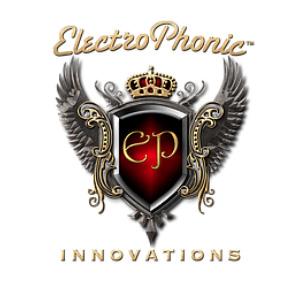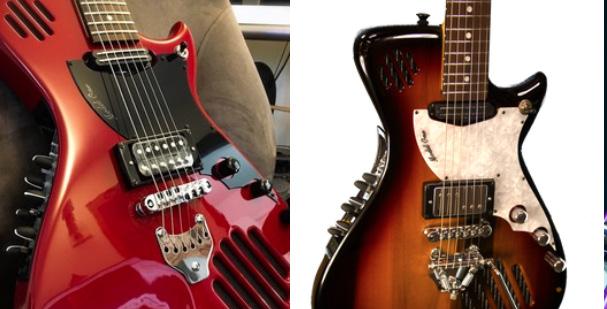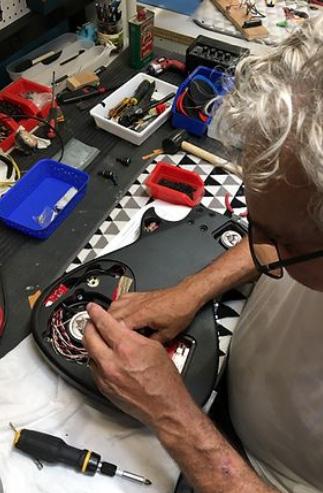
7 minute read
Andy Bloch
Engineer and businessman, Andy is an accomplished and creative executive with wide experience in music, having worked for numerous artists from Little Feat to Peter Frampton. He contributes hugely to the design and production techniques of EP guitars, and his passion for great sound and sheer beauty is clearly reflected in the instruments.

Advertisement
My system hardly fit my dorm room or later, my apartment.
When I got my first job in the music business, my dad thought I was crazy and would never make a living in music. Couldn’t argue with him as I was being paid $75 per week and working my tail off in studios and on the road. At the time I didn’t know anyone in the biz but made what few connections I had work.
When did you first think about music as something you wanted to do? Were you encouraged or discouraged by family, friends, teachers, mentors?
I’ve been a music lover since elementary school. I collected 45s and albums, had a couple of loud stereo systems, and sold 4 track tapes (mix tapes) to friends early on. When I got my first job at a recording studio, I was about 22. In college I had the biggest and baddest stereo system. What kind of kid were you? Where did you grow up? What were your influences?
I was a bit of a goofball as a kid. Didn’t have a girl friend, was not an athlete, and basically couldn’t get arrested let alone get “in” with the in crowd. I think that growing up in Beverly Hills in a family where my father did well in the entertainment business, I had a certain confidence that I could try a few things before I ended up on the street. That was extremely important to my success.

How has the background you got producing music and working in the music tech world help you now with this break out product?
When I think back about my background in the music and technology business, coupled with my geeky attraction to the first computers, most everything I’ve done has been additive to my profile and success. For example, I started in college studying computer science. Very early on. At the time Bill Gates was in Albuquerque, New Mexico building the first personal computers (pcs), I was building my own computers and creating elaborate software programs. I got a night job at a recording studio while I was in college. That put me over the moon and I realized that if I had computer/electronic skills, and music engineering skills I would be happy and would attract enough attention to get my foot in the door. It did.
You’ve worked in a couple different areas of the music world. How did that evolve and is that an asset for you?
I have worked in several different areas of music. Again, it evolved that way because I felt it would be where the world was going and I’d be there competing with the best. I still believe that what skills I have or acquire (still), make me broader and more interesting. more. Many times I was in over my head recording someone or leading a business. It can be scary stuff but if you don’t hurt yourself, you gain knowledge and experience that is priceless. I am often asked what I recommend to aspiring musicians, producers and consultants. My response is, practice, find a role model and work for them, work your ass off, watch, network and importantly, invest in yourself. For example, I used to go into the studio at midnight and work all night because my bosses gave me studio time. I was exhausted but it advanced my skills immeasurably and gave me the opportunity to network with artists of all stripes. I also tell younger people not to worry about money. It will come when and if you’re good at what you do. You should not make career decisions based on money, if possible.
What is your favorite area of the business to work in?

How do you stay up to date on styles/process outside of your own projects? What do you recommend to younger aspiring musicians and music producers who are just developing?
There’s really only one way to stay up to date and that’s to immerse yourself in that world, taking chances, and trying new stuff. Could be electronic designs, speaker designs, recording techniques and much My heart says production but my head says management. I’ve ended up in management more times than not. What most people do not understand is that business management is an art as well. It doesn’t correlate with suits and ties necessarily.


We’ve built a great team at EP Guitars. Each of us has a specialty but each has many other secondary skills. Together 1 + 1 + 1 is much greater than the sum. It is particularly evident when we are designing new products and building prototypes. Each of us contributes massively while respecting and listening to others. Designing anything can be socially stressful. Look for the beauty in every idea.
The guitar looks are great. Love the “Easy Rider V-Twin”. How do you decide on design and what the guitar and it’s assets can do?
It’s all about imagination for us. This extends to loudness, audio blending, colors and finishes. All are as important as the playability and sound quality. None of what we do would be any good unless every aspect spoke to our customers. All the senses need to be stimulated including touch, hearing, seeing and more.
What’s going on in your head when you decided to jump into this business? Your fears, anticipation, confidence, etc.? How do you know this was going to work for you?
It was with serious trepidations that I decided to start one more business. What attracted me was the uniqueness or the product and vision, and the fact that it was an evolution of an instrument that has not changed in more than 50 years. I like being out front and on the bleeding edge at bit. That adrenaline energizes me and allows one to do things you’d never be able to do normally. Again, there is stress too and you have to be able to manage that if you’re to be a designer or entrepreneur.
Who if anyone influences your work?
So many people in so many ways. I also have negative influences as well. I look at some artists and executives that I’ve worked with who I hated and thought that they were totally off track but successful. A lot was learned from these guys too. What “not to do you might say.” On the positive side I’ve looked many influencers from Picasso, to Santana, to Larry David. All have made me richer and improved my work.
Anything and everything we can afford. Our marketing program for the first few years was simple. Get as many guitars out into the wild for people to play (and talk about), and get professionals to use our guitars giving us cred. Now that we have some money we can do ads and other brand-enhancing strategies. For non-fiction, I think that Tom Wolfe had no peer.
What’s the future hold for you? Any ultimate goal?
Stay healthy and keep busy doing what I love. Music, music and music. I would love to work closer with many other artists inspiring them to create new music.
If you could meet anyone in the field you’re in who would it be and why?
Love to meet Jimi. (Deceased Uber-guitarist Jimi Hendrix). But more accessible might be Mark Knofler. His sound is exquisite.
PRODUCT NOTES
The ElectroPhonic™ guitar is an evolution of the art and science, and is destined to find its place alongside traditional electric and acoustic guitars. The hardwood body of an EP guitar (its “tone cabinet”) combines sonic qualities and elements of both electric and acoustic guitars.
EP has combined modern technology and design with traditional luthier build practices, to bring every lover of high quality, eminently playable guitars something new and exciting to unleash their creativity.
Our premier instrument, the Model One EP, is just the beginning of a new generation of electric guitars.
COOL, THOUGHT OUT FEATURES
Whether you’re a seasoned session player or an inspired beginner, the EP Model One will get you closer to your music than any other guitar can.
From Scratch and Seasonal, Using the Freshest Ingredients.







